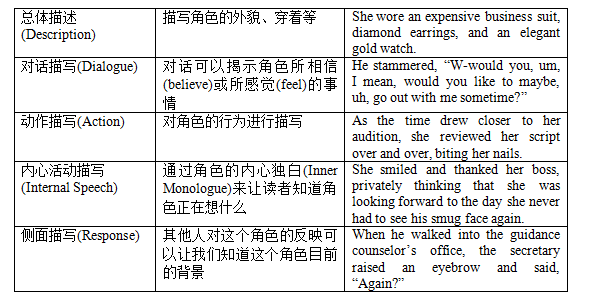如何阅读SAT文学类篇章 - 如何阅读小说的细节?
SAT阅读小说的过程中,细节不容忽视。阅读文章的过程中有几类细节需要关注,这些往往就是题目要考查的点。
1. 修辞。修辞出现的地方,往往充满隐含意思。新SAT的阅读题目往往考查隐含意思,要求考生解析修辞语言部分的含义,或者分析修辞语言部分的作用和效果。
修辞语言部分前面有详细讲解。此处简单列出七种基本的类型:

正确认识这些修辞语言能帮助考生更好理解小说故事内涵。关注hyperbole, idioms,也能metaphor, personification和similes的使用能帮助考生回答诸如意思理解和修辞作用类的题目。正确理解文章的各要素才能明白文章要传达的信息,正确理解这些修辞语言的使用才能跟上故事情节。关注alliteration和onomatopoeia的使用能够了解作者的意图,以及作者为了达到意图,如何使用语言。考试中,你不需要找出这些修辞要素,但是你可能会被问及修辞使用的效用。
如果一篇文章中出现很多修辞,你不需要出标记每一个。只需简单标记,哪些段落修辞用法较多即可。
1. 人物刻画(Characterization)
小说,故事,戏剧中的人物刻画往往通过以下几种方式:

在阅读文章的过程中,要注意这些技巧的使用,可以更有效地理解人物和人物关系, 以及作者意图。
我们再以节选自安娜卡列尼娜的文本为例。
段开头
At four o'clock, conscious of his throbbing heart, Levin stepped out of a hired sledge at the Zoological Gardens, and …
其中“throbbing”生动表现了Levin的紧张感。
第三段:
He walked along the path towards the skating-ground, and kept saying to himself— “You mustn't be excited, you must be calm. What's the matter with you? What do you want? Be quiet, stupid,” he conjured his heart. And the more he tried to compose himself, the more breathless he found himself. An acquaintance met him and called him by his name, but Levin did not even recognize him. He went towards the mounds, whence came the clank of the chains of sledges as they slipped down or were dragged up, the rumble of the sliding sledges, and the sounds of merry voices. He walked on a few steps, and the skating-ground lay open before his eyes, and at once, amidst all the skaters, he knew her.
Kept saying to himself, conjured his heart等动作短语展现了Levin试图抑制自己的紧张情绪。不过我们可以看出效果一般,难以抑制 “the more he tried to compose himself, the more breathless he found himself.” 越想抑制,越难以抑制,甚至熟人跟他打招呼,他都没认出来。
第四段:
He knew she was there by the rapture and the terror that seized on his heart. She was standing talking to a lady at the opposite end of the ground. There was apparently nothing striking either in her dress or her attitude. But for Levin she was as easy to find in that crowd as a rose among nettles. Everything was made bright by her. She was the smile that shed light on all round her. Is it possible I can go over there on the ice, go up to her?” he thought. The place where she stood seemed to him a holy shrine, unapproachable, and there was one moment when he was almost retreating, so overwhelmed was he with terror. He had to make an effort to master himself, and to remind himself that people of all sorts were moving about her, and that he too might come there to skate. He walked down, for a long while avoiding looking at her as at the sun, but seeing her, as one does the sun, without looking.
But一词刻画了Kitty在Levin心目中的与众不同。Levin甚至将Kitty站立着的地方比喻成a holy shrine. 神圣的地方。Retreating, overwhelmed, terror, had to make an effort等一系列细节描写烘托出了Levin觉得自己在Kitty的美好圣洁面前感到恐惧,担心。
文学类的文章非常善于考查这些细节描绘,比如以下这些问题:
The passage most strongly suggests that which of the following is true of Levin?
A) He worries about his appearance.
B) He wishes he were more impressive.
C) He is an extremely passionate person.
D) He is wary of his surroundings.
通过文本诸如:“the rapture and the terror that seized on his heart,”等等的描述刻画出来的Levin形象自然是个passionate,多情的,热情的人。
再比如下面一题:
The author’s use of the word “throbbing” in line 1 implies that Levin
A) has cut himself badly.
B) has a sudden pain in his chest.
C) is about to collapse.
D) is in an agitated state.
考查throbbing一词的内涵。该词充分传达出了Levin紧张的情绪,D项符合。
再看下面这题:
Based on the tone of this passage, what emotion does the author wish the reader to feel about Levin?
A) Empathy
B) Cynicism
C) Hostility
D) Disgust
Levin爱慕Kitty,却又因此恐惧,害怕。自然Levin值得读者同情。选项A正确。
总之,小说类的文章,要特别注意形容词的应用,动作描述等等。这些词汇往往传达了主人公的心理状态和变化。
Type 2一般记叙文:Memoir等
请看下面这篇Memoir的例子
In this passage, American author Mark Twain recalls his boyhood in a small town along the Mississippi River. (通过recall这个词,我们知道这是一篇回忆录)
My father was a justice of the peace, and I sup-posed he possessed the power of life and death over all men and could hang anybody that offended him. This was distinction enough for me as a general thing; but the desire to be a steamboat man kept intruding, nevertheless. I first wanted to be a cabin boy so that I could come out with a white apron on and shake a tablecloth over the side, where all my old comrades could see me. Later I thought I would rather be the deck hand who stood on the end of the stage plank with a coil of rope in his hand, because he was particularly conspicuous. But these were only daydreams—too heavenly to be contemplated as real possibilities. By and by one of the boys went away. He was not heard of for a long time. At last he turned up as an apprentice engineer or “striker” on a steamboat.This thing shook the bottom out of all my Sunday-school teachings. That boy had been noto-riously worldly, and I had been just the reverse—
yet he was exalted to this eminence, and I was left in obscurity and misery. There was nothing gener-ous about this fellow in his greatness. He would always manage to have a rusty bolt to scrub while his boat was docked at our town, and he would sit
on the inside guard and scrub it, where we could all see him and envy him and loathe him.
He used all sorts of steamboat technicalities in his talk, as if he were so used to them that he forgot common people could not understand them. He would speak of the “lapboard” side of a horse in an easy, natural way that would make you wish he was dead. And he was always talking about “St. Looy” like an old citizen. Two or three of the boys had long been persons of consideration among us because they had been to St. Louis once and had avague general knowledge of its wonders, but the day of their glory was over now. They lapsed into a humble silence and learned to disappear when the ruthless “cub” engineer approached. This fellow had money, too, and hair oil, and he wore a showy brass watch chain, a leather belt, and used no suspenders. No girl could withstand his charms. He “cut out" every boy in the village. When his boat blew up at last, it diffused a tranquil contentment among us such as we had not known for months. But when he came home the next week, alive, renowned, and appeared in church all battered up and bandaged, a shining hero, stared at and wondered over by everybody, it seemed to us that the partiality of Providence for an undeserving reptile had reached a point where it was open to
criticism.
This creature’s career could produce but one result, and it speedily followed. Boy after boy man-aged to get on the river. Four sons of the chief merchant and two sons of the county judge became pilots, the grandest position of all. But some of us could not get on the river—at least our parents would not let us.
So by and by I ran away. I said I would never come home again till I was a pilot and could return in glory. But somehow I could not manage it. I went meekly aboard a few of the boats that lay packed together like sardines at the long St. Louis wharf and very humbly inquired for the pilots but got only a cold shoulder and short words from mates and clerks. I had to make the best of this sort of treatment for the time being, but I had comfort-ing daydreams of a future when I should be a great and honored pilot, with plenty of money, and could kill some of these mates and clerks and pay for them.
这篇回忆录叙述了马克吐温小时候的故事:那就是小男孩心目中的工作就是成为水手。这也是本篇文章的Big picture.
文本开头段就介绍了自己想成为水手的梦想,中间二三段描述了一个臭名昭著的男孩当上水手后回来炫耀,小男孩们无比的羡慕嫉妒恨。第五段描述很多男孩都去当水手。最后总结:他依然会做水手的白日梦。
本片文章反应了马克吐温的水手情节。
我们还提供更多SAT资料下载:









